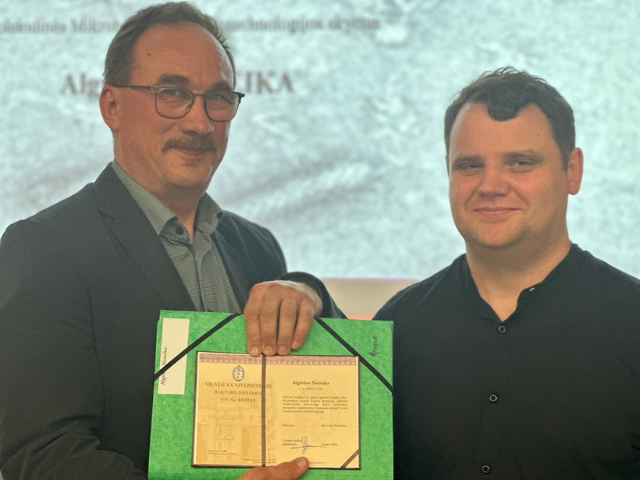Algirdas Noreika has defended his thesis entitled "Structural and functional studies of adsorption complex of the Klebsiella infecting bacteriophage RaK2" for the degree of Doctor of Science in Biochemistry.
Scientific supervisors: Dr. Eugenijus Šimoliūnas (Vilnius University, Natural Sciences, Biochemistry).
Chairperson - Prof. Dr. Saulius Serva (Vilnius University, Natural Sciences, Biochemistry); Dr. Julija Armalytė (Vilnius University, Natural Sciences, Biochemistry); Prof. Dr. Rimantas Daugelavičius (Vytautas Magnus University, Natural Sciences, Biochemistry); Dr. Aleksandras Konovalovas (Vilnius University, Natural Sciences, Biochemistry); Dr. Saulius Kulakauskas (French National Institute for Agriculture, Food, and Environment, Natural Sciences, Biochemistry).
Klebsiella spp. bacteria pose a serious threat to human health, particularly for individuals with weakened immune systems, making the development of effective countermeasures against these pathogens essential. Bacteria of the Klebsiella genus are resistant to many antibiotics, and their virulence factors further complicate the treatment of infections they cause. On the other hand, bacteriophages offer hope for infected patients, as their replication and survival depend on the destruction of bacterial cells.
The RaK2 virus is one of many bacteriophages capable of lysing Klebsiella pneumoniae. Still, it stands out due to its large genome (a “jumbo” virus of the Alcyoneusvirus genus) and the distinctive morphology of its adsorption complex. Viruses of this genus remain poorly studied, especially in terms of the structure and function of their adsorption complexes.
Thus, this dissertation focused on the branched long tail fibers present in the RaK2 phage’s adsorption complex. The study involved experiments to identify the proteins forming these fibers' location, structure, and function. This included structural modeling, virus adsorption inhibition assays, immunolabeling, and enzymatic specificity analyses.
Based on the study's results, a likely architecture of the RaK2 branched long tail fiber was proposed, and two key proteins - gp531 and gp098 - were identified as initiators of viral infection. It was also determined that the enzymatic specificity of the depolymerase gp531 corresponds to that of a beta- (1,4)-glucosidase, which hydrolyzes the capsular polysaccharides of the K. pneumoniae K54 serotype.
 |
